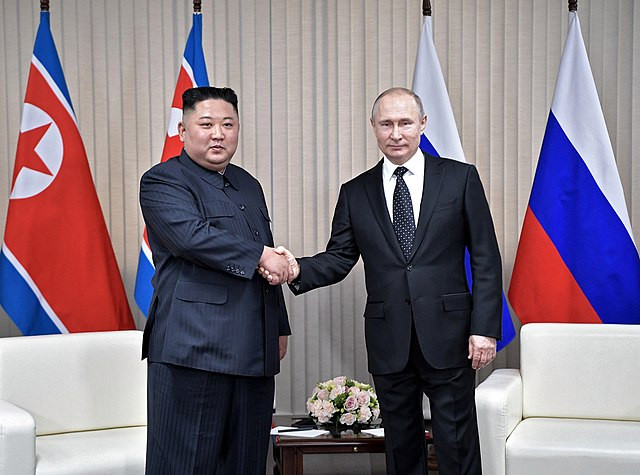The United States confirmed on Wednesday that North Korean troops have been deployed to Russia, marking a significant escalation in Moscow's war in Ukraine and raising concerns among Western allies. This is the first public acknowledgment of North Korea's direct involvement in the conflict, which had been speculated for weeks. U.S. Defense Secretary Lloyd Austin made the announcement during a press briefing in Rome, stating, "There is evidence of DPRK troops in Russia," referring to North Korea by its formal name, the Democratic People's Republic of Korea (DPRK).
"What exactly they're doing is left to be seen," Austin said, adding that the U.S. is still trying to gather more intelligence on the scope of North Korean involvement. He described it as a "serious issue," particularly if North Korea's intention is to actively participate in the war on Russia's behalf. This development follows multiple reports from South Korea and Ukraine, which raised alarms over the growing alliance between Pyongyang and Moscow.
The confirmation by U.S. officials comes after weeks of speculation, during which satellite imagery, AI facial recognition, and intelligence reports hinted at the presence of North Korean troops. According to South Korean lawmakers, North Korea has already sent 3,000 soldiers to Russia, with a total of 10,000 expected to be deployed by December. These troops are reportedly being sent in phases, with an initial 1,500 soldiers arriving in Russia's Far East for training. This deployment has doubled previous estimates, intensifying concerns over North Korea's role in the conflict.
On Tuesday, Ukrainian President Volodymyr Zelenskyy said that two units of North Korean troops, potentially comprising up to 12,000 soldiers, were being prepared for combat in Ukraine. "This is a challenge, but we know how to respond," Zelenskyy said in his nightly address, urging Ukraine's allies to recognize the gravity of the situation and respond accordingly. He emphasized that North Korea's involvement could dramatically alter the dynamics of the war, which has been raging since Russia's invasion of Ukraine in February 2022.
South Korea has also taken swift diplomatic action. On Monday, the South Korean government summoned the Russian ambassador, demanding the immediate withdrawal of North Korean soldiers and condemning the military cooperation between Moscow and Pyongyang. South Korean intelligence services believe that North Korea's special forces are being trained for combat roles in Ukraine, and there is growing pressure within South Korea to provide Ukraine with more than just nonlethal aid. As the situation escalates, South Korea is considering supplying defensive-and possibly offensive-weapons to Ukraine in response to North Korea's military support for Russia.
In Washington, the U.S. State Department expressed deep concern. Vedant Patel, a deputy spokesperson for the State Department, warned that North Korea's deployment of troops to Russia would mark "a dangerous and highly concerning development." The Biden administration is currently consulting with its allies about the implications of this dramatic escalation.
Reports of North Korea supplying artillery shells and other munitions to Russia have circulated for months. Western intelligence agencies believe that Pyongyang has provided millions of shells in exchange for military technology from Russia-technology that could bolster Kim Jong Un's nuclear and ballistic missile programs. Both Russia and North Korea have denied these claims, but the growing military cooperation between the two nations has become increasingly difficult to ignore.
The deployment of North Korean troops, if confirmed in full, could also signal a strategic shift for Pyongyang. Frank Ledwidge, a former British military intelligence officer and senior lecturer in war studies, noted that North Korea's involvement could offer significant combat experience for its relatively untested military. "North Korea gets to bring back home some combat experience," Ledwidge said, adding that this could further bolster Kim's regime at home. For Russia, the deployment of North Korean forces could provide much-needed manpower, especially as its own military continues to suffer heavy losses in Ukraine.
Satellite images released by South Korea's intelligence service have reportedly shown hundreds of North Korean soldiers gathering at Russian military training grounds. The agency also used facial recognition technology to identify North Korean soldiers in Ukraine, confirming the presence of Ri Song Jin, a North Korean soldier who had previously been photographed alongside Kim Jong Un at a North Korean weapons factory.
In addition to troops, North Korean missile technicians have reportedly been deployed to frontline areas in Ukraine to assist with the use of North Korean-made missiles. The intelligence agency suggested that these technicians are in Ukraine to troubleshoot any technical issues with the weapons and to gather additional technological insights that could benefit North Korea's missile program.
The involvement of North Korean forces in the war has revived discussions in Europe about whether Western countries should consider sending their own troops to support Ukraine. Phillips O'Brien, a professor of strategic studies at the University of St. Andrews, commented, "Everyone flips out whenever they talk about European troops going to Ukraine, that it's far too escalatory. And then the Russians just go ahead and bring in outside troops."
While North Korea's military is one of the largest in the world, with approximately 1.2 million personnel, analysts believe that the addition of a few thousand North Korean troops is unlikely to dramatically alter the course of the war. However, the symbolic significance of North Korea's involvement-coupled with its growing military cooperation with Russia-has raised concerns about the broader geopolitical implications.




